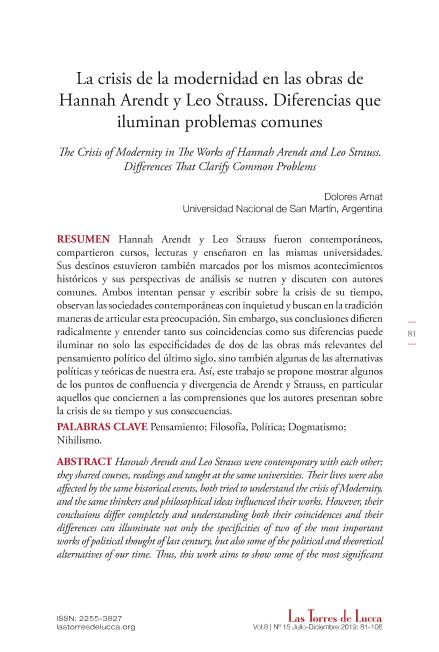Mostrar el registro sencillo del ítem
dc.contributor.author
Amat, María Dolores

dc.date.available
2021-07-23T18:30:38Z
dc.date.issued
2019-07
dc.identifier.citation
Amat, María Dolores; La crisis de la modernidad en las obras de Hannah Arendt y Leo Strauss: Diferencias que iluminan problemas comunes; Universidad Complutense de Madrid; Las Torres de Lucca; 8; 15; 7-2019; 81-106
dc.identifier.issn
2255-3827
dc.identifier.uri
http://hdl.handle.net/11336/136798
dc.description.abstract
Hannah Arendt y Leo Strauss fueron contemporáneos, compartieron cursos, lecturas y enseñaron en las mismas universidades. Sus destinos estuvieron también marcados por los mismos acontecimientos históricos y sus perspectivas de análisis se nutren y discuten con autores comunes. Ambos intentan pensar y escribir sobre la crisis de su tiempo, observan las sociedades contemporáneas con inquietud y buscan en la tradición maneras de articular esta preocupación. Sin embargo, sus conclusiones difieren radicalmente y entender tanto sus coincidencias como sus diferencias puede iluminar no solo las especificidades de dos de las obras más relevantes del pensamiento político del último siglo, sino también algunas de las alternativas políticas y teóricas de nuestra era. Así, este trabajo se propone mostrar algunos de los puntos de confluencia y divergencia de Arendt y Strauss, en particular aquellos que conciernen a las comprensiones que los autores presentan sobre la crisis de su tiempo y sus consecuencias.
dc.description.abstract
Hannah Arendt and Leo Strauss were contemporary with each other; they shared courses, readings and taught at the same universities. Their lives were also affected by the same historical events, both tried to understand the crisis of Modernity, and the same thinkers and philosophical ideas influenced their works. However, their conclusions differ completely and understanding both their coincidences and their differences can illuminate not only the specificities of two of the most important works of political thought of last century, but also some of the political and theoretical alternatives of our time. Thus, this work aims to show some of the most significant coincidences and differences of Arendt and Strauss, particularly those related to their understandings of the crisis of their time and its consequences.
dc.format
application/pdf
dc.language.iso
spa
dc.publisher
Universidad Complutense de Madrid

dc.rights
info:eu-repo/semantics/openAccess
dc.rights.uri
https://creativecommons.org/licenses/by/2.5/ar/
dc.subject
PENSAMIENTO
dc.subject
FILOSOFÍA
dc.subject
POLÍTICA
dc.subject
NIHILISMO
dc.subject.classification
Otras Ciencia Política

dc.subject.classification
Ciencia Política

dc.subject.classification
CIENCIAS SOCIALES

dc.title
La crisis de la modernidad en las obras de Hannah Arendt y Leo Strauss: Diferencias que iluminan problemas comunes
dc.title
The Crisis of Modernity in The Works of Hannah Arendt and Leo Strauss: Differences That Clarify Common Problems
dc.type
info:eu-repo/semantics/article
dc.type
info:ar-repo/semantics/artículo
dc.type
info:eu-repo/semantics/publishedVersion
dc.date.updated
2021-06-30T16:48:10Z
dc.journal.volume
8
dc.journal.number
15
dc.journal.pagination
81-106
dc.journal.pais
España

dc.journal.ciudad
Madrid
dc.description.fil
Fil: Amat, María Dolores. Consejo Nacional de Investigaciones Científicas y Técnicas; Argentina. Universidad Nacional de San Martín. Instituto de Altos Estudios Sociales; Argentina
dc.journal.title
Las Torres de Lucca
dc.relation.alternativeid
info:eu-repo/semantics/altIdentifier/url/https://revistas.ucm.es/index.php/LTDL/issue/view/3834
Archivos asociados
